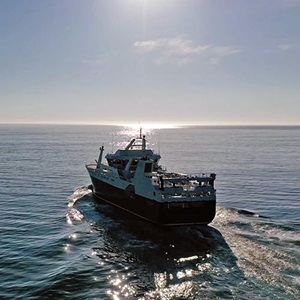The MSC aims to reduce ghost fishing by recognizing fisheries that avoid gear loss and minimize waste.
Ghost gear is fishing gear that has been abandoned, lost, or discarded in the ocean. Fishing gear lost at sea can drift and entangle ocean life. Discarded fishing nets can smother coral reefs, while abandoned crab pots can continue trapping marine creatures on the ocean floor. There is also increasing evidence that ghost gear contributes to the problem of marine plastics.
Although the vast majority of plastic in the ocean comes from people's homes, lost fishing gear also contributes a significant amount. Although further research is needed to fully understand the scale of gear loss, the UN Food and Agriculture Organization (FAO) estimates that at least 640,000 tonnes of fishing gear is lost each year, and that fishing gear makes up 10% of all marine debris.
The MSC requirements for ghost gear
Fisheries certified to the MSC Fisheries Standard should minimize gear loss and must know the impact any lost gear could have on habitats and ecosystems.
Exact requirements regarding ghost fishing are set out within the Fisheries Standard. These are part of wider requirements on certified fisheries to minimize all operational waste.
The new version of the MSC Fisheries Standard includes strengthened requirements to ensure the impacts of ghost gear are explicitly considered during every fisheries assessment.Fisheries must implement management strategies to minimize gear loss and manage any impacts of lost gear. This could include measures to monitor lost gear, marking and retrieval programs, and gear modifications, such as biodegradable locks on pots.
Fisheries that use Fish Aggregating Devices (FADs) are now required to account for lost FADs and demonstrate that loss is being avoided and managed, including tracking and retrieving lost FADs.
Latest global efforts
Many MSC certified fisheries have found new ways to manage the risk of ghost gear.
When the Alaska Pacific cod fisheries became MSC certified, they were required to monitor gear loss to maintain their certification. They also assessed the impacts of lost gear on ecosystems. These fisheries monitored the impacts and loss of their long lines, pots and trawl nets. Cod fishing pots in these fisheries have biodegradable escape panels and escape rings to minimize ghost fishing.
In the MSC certified Normandy and Jersey lobster fisheries, all pots are tagged with boat registration and year. Fishers must report lost pots and only a limited number of replacement tags are available. This system motivates fishers not to lose their pots.
The Echebastar Indian Ocean purse seine skipjack fishery received support from the MSC’s Ocean Stewardship Fund to improve the sustainability of operations using FADs in the Indian Ocean. The project will investigate the impact of lost FADs on corals and will support the FAD Watch initiative to intercept lost FADs in the Seychelles.




